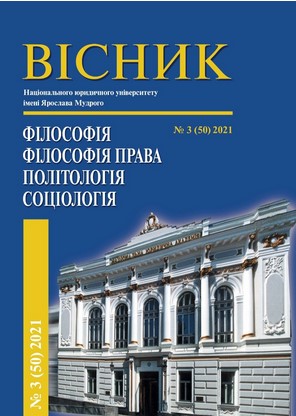ТЕОКРАТИЧНІ ІДЕЇ АВГУСТИНА БЛАЖЕННОГО ТА ЇХ СЕРЕДНЬОВІЧНА ІМПЛЕМЕНТАЦІЯ
BLESSED AUGUSTINE’S THEOCRATIC IDEAS AND THEIR MEDIEVAL IMPLEMENTATIONS
Author(s): Svitlana Borysivna ZhdanenkoSubject(s): Christian Theology and Religion, History of Church(es), Political Philosophy, Political history, Middle Ages, Philosophy of Middle Ages, Politics and religion
Published by: Національний юридичний університет імені Ярослава Мудрого
Keywords: Roman Republic; political values; power; violence; theocratic state;
Summary/Abstract: In the article it is illustrated by theocratic ideas of St. Augustine that the political thought in the Middle Ages was closely connected with theology. According to Augustine the course of human history is determined by Divine Providence and is a struggle between Good and Evil. Deity is just a source of goodness, the evil emerges of free will of a human. In accordance with the struggle between Good and Evil the World History is divided into two directions: God ’s believers build the City of God, Satan’s followers build secular terrestrial State. In his teachings of two Cities Augustine comes out of the theory of the unity of the human being. He explains that the main principle of the political thought of the Middle Ages which has been reflected in the XIII century is theocracy, superiority of supreme value – God – over the ideas of government and identity embraced as values. Augustine emphasized that all kingdoms on Earth are under the authority of God. Augustine tried to distinguish between the running of the country from the point of view of Christian governor and usual terrestrial lords. In terms of the City of God the happiness of the lords consists in that they rule for a long while, die a natural death transferring power to sons, to conquer the enemy countries, to placate or avoid rebellions. Another matter is mission and responsibilities of the Christian emperors which belong to the Kingdom of God. Augustine said we call them happy if they rule fair, fear and worship God, use the power to widespread respect for God and serving His Majesty. It is noted that Augustine attributed to the Christian rulers such qualities as modesty in the manner, a desire to rule over bad inclinations rather than the heathen, offering sacrifices of humility for the sins to God, repentance and prayer. Augustine sure that those people who are truly pious and lead a Christian life, should master the art of managing nations. If by the grace of God they get power, it would be the best for mankind.
Journal: Вісник НЮУ імені Ярослава Мудрого. Серія: Філософія, філософія права, політологія, соціологія
- Issue Year: 32/2017
- Issue No: 1
- Page Range: 53-63
- Page Count: 11
- Language: Ukrainian

